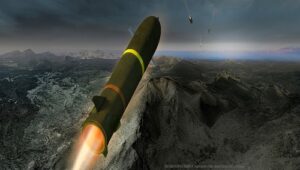Boeing [BA] and Norwegian defense firm Nammo have announced a successful test of its Ramjet 155 projectile weapon, which the two companies developed for the Army’s program to find new long-range artillery solutions.
During the June 28 test at the Andøya Test Center in Norway, Boeing and Nammo said the Ramjet 155 weapon was fired out a cannon, with the ramjet engine igniting successfully and achieving flight stability “with a well-controlled engine combustion process.”

“We have great confidence in the ramjet concept,” Nammo CEO Morten Brandtzæg said in a statement. “The test – with all aspects from cannon firing, to the projectile body, fins, and trajectory all functioning perfectly – represents a real technological breakthrough in artillery, and a major success for Boeing, Nammo, and the U.S. Army”
The Army selected the team of Boeing’s Phantom Works prototyping division and Nammo to work on developing and maturing their Ramjet 155 solution in July 2019 under the XM1155 program, which was followed by a follow-up award last May for a second phase focused on further technology development.
“Ramjet 155 uses an engine in which the air drawn in for combustion is compressed solely by the forward motion of the projectile at supersonic speeds,” Boeing wrote in a statement. “Considered a hybrid between guided artillery and missiles, the program has an objective of a common round design that can be used in L39 and L58 cannons.”
The XM1155 program aims to develop new ramjet-powered munitions for the Army’s future Extended Range Cannon Artillery (ERCA) system.
ERCA is the Army’s effort to field a new 58-caliber, 30-foot gun tube on BAE Systems’ M109A7 self-propelled howitzer chassis in 2025, which is designed to hit targets out to 70 kilometers at a rate of six to 10 rounds per minute.
Boeing and Nammo said the recent long-range flight test with the Ramjet 155 follows years of research and development work, to include more than 450 static or short-range tests.
“We believe the Boeing Ramjet 155, with continued technology maturation and testing, can help the U.S. Army meet its long-range precision fires modernization priorities,” Steve Nordlund, vice president and general manager of Boeing Phantom Works, said in a statement.
The two companies said work continues to develop and mature the Ramjet 155, with additional testing and demonstrations planned for the coming months.